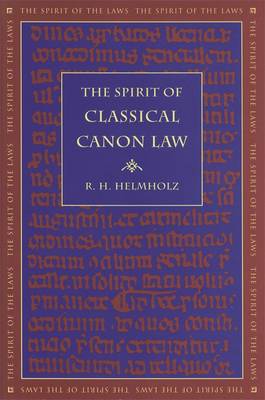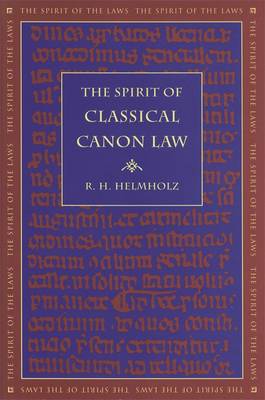
- Afhalen na 1 uur in een winkel met voorraad
- Gratis thuislevering in België vanaf € 30
- Ruim aanbod met 7 miljoen producten
- Afhalen na 1 uur in een winkel met voorraad
- Gratis thuislevering in België vanaf € 30
- Ruim aanbod met 7 miljoen producten
Zoeken
€ 77,95
+ 155 punten
Omschrijving
Despite the long reach of classical canon law--across Europe, well into modern times, and into such secular subjects as theft, wills, and the sale of goods--it has been the subject of far too few general studies in English. Illuminating the basic nature of the canon, this work explores the roles of moral, social, political, and religious values in the laws' development through the seventeenth century. At the same time, R. H. Helmholz makes relevant the attitudes and formal techniques of the laws' authors, practitioners, and interpreters.
Helmholz first discusses the origins of the canon law; the collection of texts, known as the Corpus iuris canonici, which form its foundation; the basic sources on which the Corpus draws, including the Bible and Roman law; and the body of juristic commentary on the Corpus. He then considers, in turn, fourteen of the major areas affected by the laws such as the governance of the Church (in particular the law of election of bishops), the sacraments (baptism), and legal sanctions (the law of excommunication). In conclusion, Helmholz points to three common themes that characterize the laws and their implementation: their close connection with the goals and ideals of the Gregorian reform movement, a concern for the spiritual health of all concerned parties, and an interest in securing justice and protection for the unfortunate. Helmholz also comments on the lawyerly skill of the men who devoted their careers to the canon law and the law's ambitious goals. He does not shrink from describing its unpalatable aspects, such as its acceptance of slavery, its restrictions on religious freedom, and its use as an instrument of the clergy's agenda. The size and complexity of the body of church law and its jurisprudence have kept historians in many fields from appreciating how this topic might enrich their studies. The Spirit of Classical Canon Law provides them with the ideal entree.Specificaties
Betrokkenen
- Auteur(s):
- Uitgeverij:
Inhoud
- Aantal bladzijden:
- 528
- Taal:
- Engels
- Reeks:
Eigenschappen
- Productcode (EAN):
- 9780820334639
- Verschijningsdatum:
- 15/05/2010
- Uitvoering:
- Paperback
- Formaat:
- Trade paperback (VS)
- Afmetingen:
- 152 mm x 229 mm
- Gewicht:
- 766 g

Alleen bij Standaard Boekhandel
+ 155 punten op je klantenkaart van Standaard Boekhandel
Beoordelingen
We publiceren alleen reviews die voldoen aan de voorwaarden voor reviews. Bekijk onze voorwaarden voor reviews.







